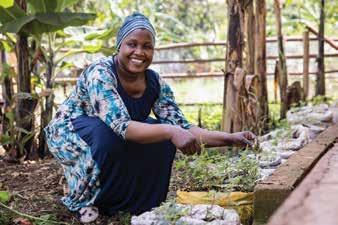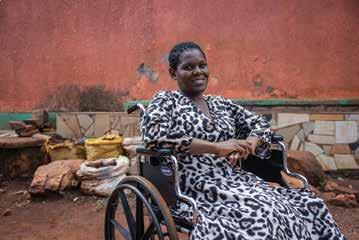
3 minute read
HOMEGROWN APPEAL
100% Homegrown Appeal
In Uganda, a group of disabled people have set up their own kitchen gardens with support from Frome based charity ADD International. This means that they can grow their own food, like tomatoes, aubergine, greens and onions, in ways that are easy for them to manage. Here we look at just three of their stories.
Advertisement
Fazira

Fazira set up her garden by planting seeds in sacks and tins just outside of her home, which she can easily reach to water and harvest. She is visually impaired and says setting up her garden in this way makes it accessible to her. Now, she wants to support young disabled people to set up their own kitchen gardens, and be independent. “I am where I am because I was supported by other people with disabilities. They have been there for me. In the same spirit I also want to share and support. Young people need to be supported to start a small kitchen garden.”
Homegrown Leaders
Because people like Fazira and Justine know what is it like to be disabled, and to live in Uganda, they, along with other disability rights activists (people who are campaigning for disabled people to have equal rights) are designing and leading the project. ADD International is supporting them by raising money and helping to run the project. You can find out more about the appeal at: www.add.org.uk/homegrownmedia 4.

Lydia
During lockdown, Lydia was unable to access food and ran out of money. She set up a small garden using sacks and tins that she could access easily from her wheelchair. “Some people think they can’t grow because they are renting. But during covid I grew onions in tins. I have some sacks for a garden. I can reach them easily and where I need help I ask. I grow for eating. I find it interesting and it saves money to grow your own.” She explains that gardening is also very good for your mental health. “Covid was tough. I ran out of money. Then food ran out. So I concentrated on my garden. I was stressed and I needed to see green. That’s when I planted so many peas. For two reasons, one, I wanted to see green, and I wanted to eat peas. My favourite meal is matooke (a kind of banana that is steamed and mashed ) and peas and I like my food with a lot of onions so I grow onions and tomatoes too. In that time we were also advised to eat a lot of fruit and vegetables to stay healthy so my garden helped me do that.”

Justine (left) lost her job because of being disabled, which is an example of discrimination. She started a kitchen garden to grow vegetables and earn money. In Uganda school isn’t free. She said: “Farming has enabled me to provide for my children, for their school fees, and also for my own needs.”
About ADD International
ADD International is a disability rights organisation. This means they partner with organisations run by disability activists around the world to Find out more You can read more about Fazira and Justine and their gardens at www. add.org.uk/homegrown. You can also follow on social media by searching for ADD International. support them in changing the world for the better. ADD International does this by sharing tools, resources and money with them so that they can lead the way in fighting against discrimination and being free to live their best lives. Join in the summer holiday challenge and start your own tin-garden. Reuse an old tin, fill it with soil and plant your seeds. ADD International would love you to share what you’ve grown with them, or ask an adult to do this on your behalf. Send a photo of your tin plant to communications@ add.org.uk or post it on social media tagging @ addinternational On International Youth Day, 12 August 2022, they will be sharing your photos of what you’ve grown in your tin gardens and selecting a winner.






